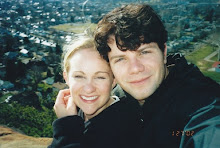 In the car the other day, as I was driving up to Ontario from KC, I decided I'd take the opportunity to 'read' a book on CD that I was unlikely to get around to ever actually reading. I went with the much hyped What Happened by Scott McClellan, George Bush's press secretary from 2003 to 2006. While I won't presume to add much to the large number of reviews out there, I'll simply post some of my thoughts on the book.
In the car the other day, as I was driving up to Ontario from KC, I decided I'd take the opportunity to 'read' a book on CD that I was unlikely to get around to ever actually reading. I went with the much hyped What Happened by Scott McClellan, George Bush's press secretary from 2003 to 2006. While I won't presume to add much to the large number of reviews out there, I'll simply post some of my thoughts on the book.Since it's release this spring, the book has received a lot of publicity as the memoir of an administration insider who came to be somewhat critical of the Bush cadre and their handling of a variety of issues. Receiving much of the attention were McClellan's comments about the administration coming to believe their own rhetoric in the lead up to the war in Iraq, coupled with their inability (or unwillingness) to ever honestly and critically assess the results of their own actions and policies. Overall, these thoughts may not be as revelatory as one would have hoped since many of McLellan's criticisms had been speculated about much earlier by others who were opposed to the war and critical of the Bush administration. Being one such person myself however, there were moments in the book where I had a self righteous 'told you so' sense of satisfaction when receiving verification of my opinions from someone with first hand knowledge of the administration.
An additional portion that I felt added to my understanding of the political machinery behind the Iraq war was the admission by McClellan that Bush's real vision and intentions for the war revolved around the notion of transforming the Middle East by introducing American style democracy. Bush saw the invasion of Iraq as the lynchpin to such a transformation which would then spread throughout the region. Since the American public would be unlikely to support the war with it's cost in lives and money based on such a rationale, the marketing of the war required a different theme. Thus, the selling of the war to the American public revolved around the idea that Iraq posed a clear and imminent threat to the American (and Western) way of life, even though evidence for such a notion was flimsy at best and non-existent at worst. Providing some verification that Bush and co. were never being completely forthright about the evidence or their intentions during the run up to war.
McClellan chronicles his own time working for Bush from the late 90's when Bush was Governor of Texas, up to the abrupt ending of his tenure as press secretary in 2006. In the process, Mclellan is probably more detailed than he needs to be when describing his 'behind the scenes' experiences and perspectives, but from time to time he has an interesting insight or observation about the administration that may not have been apparent to a non-insider. One example being his description of the progression from Bush functioning as a popular and ostensibly bi-partisan governor to a presidential administration that is extremly insulated, defensive, and secretive. Generally, you get the feeling that despite his criticisms, McLellan maintains a deep admiration for the President. McClellan even succeeds in humanizing Bush (to an extent) for someone like me who has always thought of Bush to be out of touch with the majority of humanity. McClellan appears to have less admiration for others in the administration that he feels hung him out to dry as their representative to the press during the yellow-cake and Plame affairs.
To a fault McClellan paints a picture of himself as something of an accidental beneficiary who stumbles into a number of high profile positions and opportunities without actively jockeying for a position in the halls of power. He may be doing this unintentionally, but he may also be attempting to veil his ambitious aspirations and perhaps feign humility. The result is a narrative that had me thinking to myself, "This guy sounds like the Forrest Gump of the American political scene" every time he described some new advancement opportunity he was faced with. Generally speaking, the book is probably much longer than it needs to be for the little bit of insight I actually derived from it. For that reason, I'm glad I listened to the 12 hour reading as I drove, rather than using time that could have otherwise been productive.













No comments:
Post a Comment